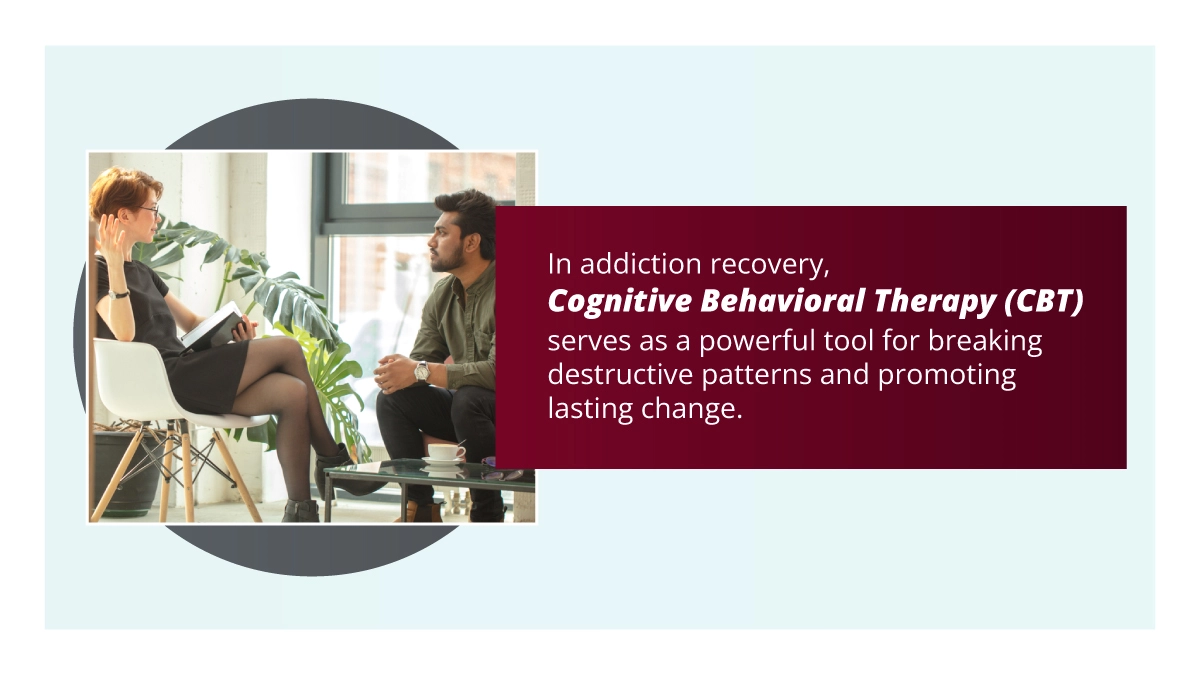
Cognitive Behavioral Therapy (CBT) in Indiana
Cognitive Behavioral Therapy (CBT) is a widely recognized and highly effective therapeutic approach that addresses the underlying thoughts, emotions, and behaviors that contribute to addiction.
In our CBT program, patients work closely with our team of experienced therapists who specialize in addiction treatment. Through a combination of individual and group therapy sessions, patients learn to recognize and change self-destructive thought patterns, manage cravings and triggers, and develop healthier behaviors and coping mechanisms.

Cognitive Behavioral Therapy (CBT) Philosophy
Cognitive Behavioral Therapy (CBT) operates on the premise that our thoughts and beliefs influence our feelings and actions. When individuals can identify and challenge distorted thought patterns or beliefs, they can gain better control over their behavior and emotions.
CBT focuses on the present moment and practical problem-solving strategies. Rather than thinking about past trauma or concerns about the future, CBT encourages individuals to address the present moment, which are the thoughts, feelings, and behaviors contributing to their addiction.
Cognitive Behavioral Therapy (CBT) In Addiction Recovery
In addiction recovery, Cognitive Behavioral Therapy (CBT) serves as a powerful tool for breaking destructive patterns and promoting lasting change. Here’s how CBT works to support individuals on their journey towards sobriety:
Identify and challenge negative thought patterns.
Through guided self-reflection and introspection, patients learn to identify irrational or harmful thoughts related to their substance use, such as feelings of low self-worth, hopelessness, or the belief that they cannot cope with life’s challenges without drugs or alcohol.
Learn skills to manage cravings and triggers.
Patients learn various techniques, such as relaxation exercises, mindfulness meditation, and distraction strategies, to cope with cravings and urges in healthy ways.
Address underlying issues that contribute to addiction.
Therapists work with clients to explore past traumas, unresolved conflicts, and dysfunctional family dynamics that may contribute to substance abuse.
Promote long-term sobriety.
Through ongoing therapy sessions and support groups, individuals learn to anticipate and cope with potential setbacks, triggers, and high-risk situations.
Why Choose Cognitive Behavioral Therapy (CBT)?
Cognitive behavioral therapy offers a variety of benefits for individuals grappling with addiction, providing a structured and evidence-based approach to achieving lasting recovery. Here are some of the key advantages of CBT for addiction and mental health:
- Practical coping skills: By learning and practicing these skills in therapy sessions and real-life situations, individuals develop greater resilience and resourcefulness in facing the challenges of addiction recovery.
- Flexibility and adaptability: CBT is a flexible and adaptable therapeutic approach that can be tailored to meet each individual’s unique needs and preferences. Therapists work collaboratively with clients to develop personalized treatment plans based on their goals, challenges, and strengths.
- Empowerment and self-efficacy: When developing a deeper understanding of their own thought processes and learning practical coping skills, individuals gain a sense of control over their behavior and emotions, resulting in a greater sense of self-efficacy and autonomy in their recovery.
- Long-term sustainability: Through ongoing practice and reinforcement of CBT principles, individuals can maintain sobriety and continue to experience improvements in their overall quality of life beyond rehabilitation.
What Makes Cognitive Behavioral Therapy (CBT) Different?
Cognitive Behavioral Therapy follows a structured and goal-oriented approach, with therapy sessions focused on specific treatment goals set collaboratively between therapist and patient. Instead of long-term exploration, CBT emphasizes short-term interventions to achieve specific treatment goals collaboratively set between the therapist and patient.
A defining characteristic of CBT is its reliance on empirical research and evidence-based practices. This proven approach assures patients that the techniques utilized are supported by research and have been shown to be effective in similar cases.
While some other therapies focus primarily on insight and introspection, CBT incorporates practical techniques to modify maladaptive behaviors associated with addiction. Through guided practice and reinforcement, individuals learn to manage cravings, cope with stress, and develop healthier habits, leading to sustainable changes in behavior and thought patterns. Overall, CBT distinguishes itself through its present-focused, evidence-based, and skill-building approach.
Integrating Cognitive Behavioral Therapy (CBT) Into Care
Cognitive Behavioral Therapy can be applied to a wide range of psychological and emotional issues. In the context of addiction treatment, CBT is particularly beneficial in addressing substance use disorders and co-occurring mental health conditions. Here are a few conditions CBT can help treat:
- Substance Use Disorders (SUDs)
- Anxiety Disorders
- Depressive Disorders
- Personality Disorders
- Post-Traumatic Stress Disorder (PTSD)



